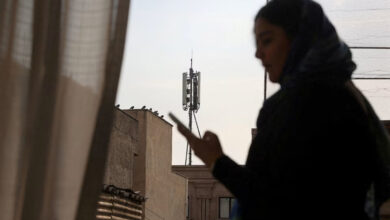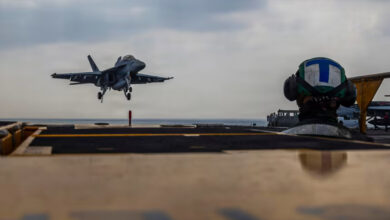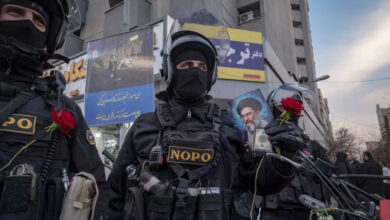Riyahd–Defense Secretary Robert Gates arrived in Saudi Arabia on Wednesday to discuss efforts to put pressure on Iran, stabilize Yemen and to urge the Saudis to engage with Iraq ahead of the US withdrawal.
Gates, fresh from a three-day visit to Afghanistan, also may discuss Kabul’s attempts to pursue reconciliation with Taliban insurgents.
US defense officials, briefing reporters ahead of the trip, said Gates will meet King Abdullah and discuss US efforts to impose sanctions on Iran over its nuclear program.
"The Secretary will provide an update … about where we are in our Iran policy, as we’ve pivoted from the engagement track to the pressure track," said the official, who asked not to be named.
The United States has expanded land- and sea-based missile defense systems in and around the Gulf to counter what it sees as Iran’s growing missile threat, and arms sales to Gulf allies have risen sharply in recent years.
Saudi Arabia bought $3.3 billion in US arms in fiscal 2009, according to a Pentagon estimate. US officials did not expect new sales to be announced during Gates’s trip.
"It’s not lost on the Iranians, all of the security cooperation that’s been going on for years now and all the systems that have been purchased over the last several years, (are) all designed to counter-weight and protect against the growing threat posed by Iran," Pentagon press secretary Geoff Morrell said.
Gates, who may also meet the kingdom’s crown prince, will press for Saudi engagement in Iraq, particularly as Washington prepares to withdraw its forces by the end of 2011.
King Abdullah has refused to meet Iraqi Prime Minister Nuri al-Maliki or open a Saudi embassy in Baghdad.
But the US defense official pointed to signals that the kingdom might be more willing to engage with Iraq, including Abdullah’s recent meeting with former Iraqi prime minister Iyad Allawi, a leading figure in Sunday’s election.
"Saudi Arabia’s major concern in Iraq is that as (US forces) leave, Iran is going to fill in the void. And our answer then is: ‘Engage with the Iraqi government. Get a seat at the table’," a US official said.
Saudi Arabia, which sees itself as the bastion of Sunni Islam, is alarmed at rising Iranian influence and the postwar dominance of Iraq’s previously disempowered Shia majority.
Talks also were expected to include instability in Yemen, which US and Saudi officials fear al Qaeda is exploiting in order to use the country as a base to prepare attacks in the region and beyond.
The Yemen-based regional arm of al Qaeda claimed responsibility for a failed attempt to bomb a US-bound passenger plane in December and the US has stepped up counter-terrorism assistance to the country.
Gates may also discuss Afghan President Hamid Karzai’s efforts to pursue reconciliation with the Taliban. Saudi Arabia has helped arrange contacts between Karzai’s government and Taliban representatives in the past.




